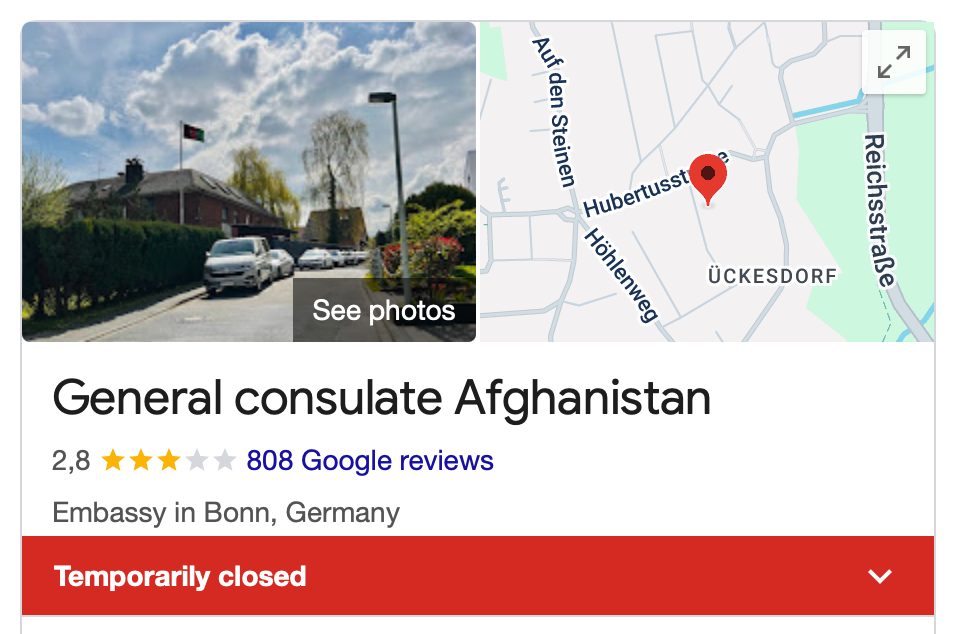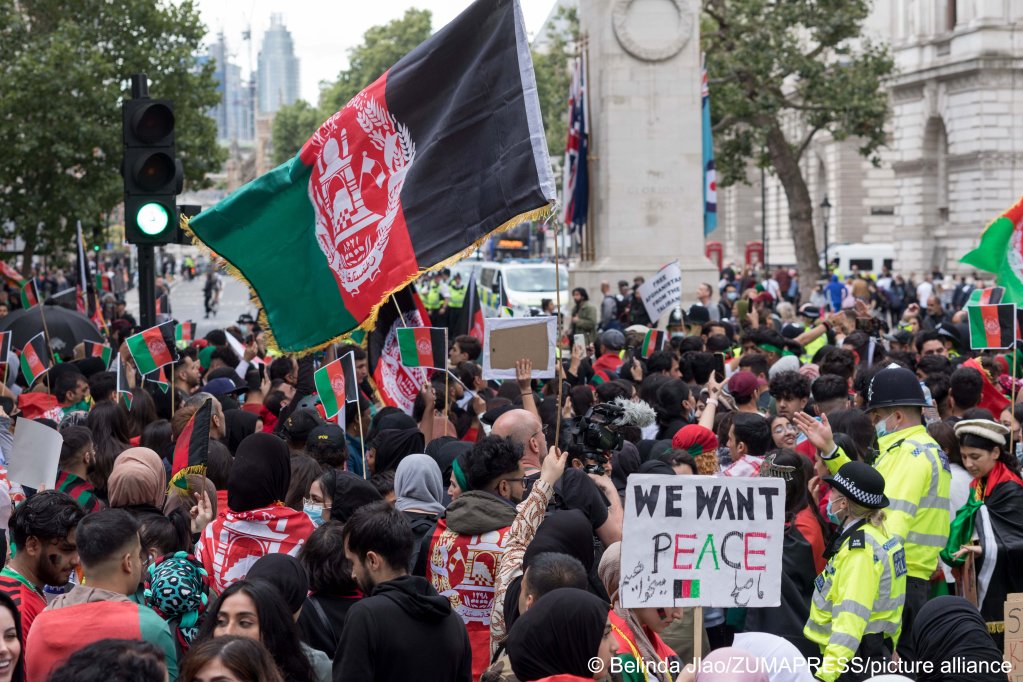The Consulate General of Afghanistan in Germany's former capital Bonn has closed its doors, effectively leaving thousands of Afghans in its catchment area without access to consular services.
If you look up the Afghan Consulate General in Bonn, Germany on Google, you will as of today be greeted with a message saying that the diplomatic facility is "temporarily closed."
It is uncertain how temporary exactly this closure is intended to be — however, the events that led up to the closure are well documented and are very much a matter relating to persecution, protection and migration.
The momentous decision to close the facility came after the Taliban-run de-facto Afghan government in Kabul made an announcement earlier this year, stating that all documents issued by Afghan embassies and representative offices in Western countries would no longer be considered valid as official documents.
The Taliban government stated that many of its diplomatic outposts had been acting "without coordination, arbitrarily, and in violation of the applicable principles" — meaning that officials working at these facilities had not been adhering to what is normally regarded as standard protocol and communicating directly with those who view themselves as their superiors in Kabul.

Representing a country which no longer exists
Since the government takeover of Afghanistan by the Taliban in August 2021, many of the country's embassies and consulates around the world have been operating as the last remaining outposts and representatives of a country, which no longer exists — The Islamic Republic of Afghanistan.
They all have been rejecting the de facto administration of Afghanistan by the radical Islamist group by continuing to represent the version of Afghanistan prior to the change in regime, as well as its values.
Most ambassadors, consulates, attachés and other staff working at these consular offices had been dispatched to their respective stations before this violent changeover in leadership in 2021.
By rejecting the new, Taliban-run "Islamic Emirate" of Afghanistan, these diplomatic outposts have managed to continue to provide consular services in the past four years, issuing whatever documents Afghan nationals abroad needed while still flying the country's old flag — literally.

Read AlsoAfghanistan: IOM sounds alarm over returning migrants
Running Afghan consular services as a 'small private enterprise'
However in the past two years, this organized resistance against Kabul has increasingly been eroding, with more and more consular services disappearing completely — either due to a lack of funds or the establishment of diplomatic relations by host countries with the Taliban-run "Islamic Emirate of Afghanistan."
Since July this year, the pace of such closures has picked up considerably, leaving Afghan nationals living in many Western countries and elsewhere increasingly stranded and isolated.
The consulate general in Bonn long appeared to be an exception to this growing trend: A recent report on Germany's main daily public broadcast news program, Tagesschau, compared the operation of the consulate in Bonn to "a small private enterprise" rather than the official representation of a country.
The consulate had been financing its own continuation by charging various amounts for services for the past four years: For example, identity verification documents to present to authorities in Germany cost €70, while a five-year passport extension cost €100.
With over 200 people presenting at its premises daily, the Bonn facility with its 20 diplomats and local staff apparently managed to stay afloat using this business model.
So what changed?
Read Also Germany turns to Taliban to deport Afghan criminals amid migration policy shift
Bonn consulate refuses to enter deals with the Taliban
German immigration authorities had been accepting this way of doing business, aligning Germany's own values with that of the previous Afghan administration too.
However, it recently emerged that two representatives of the Taliban government would soon be accepted by the German government to work in the country — one in Bonn and the other presumably in Berlin.
On September 29, the Afghan consulate in Bonn decided to react to this development by bringing its part of this bargain to an end, with all staff collectively resigning and therefore halting all of the consulate's activities.
Acting Consul General Kabiri said in a video online that Germany's decision to include "illegitimate" Taliban representatives at his office was "unacceptable," adding that this would amount to a threat to the "professional independence" of the consulate.
Kabiri added that all the equipment at the "highly sensitive consular office" would be handed over to the German Federal Foreign Office for safekeeping in order to hinder sensitive information from falling into the hands of the Taliban.
Perhaps as a final, nostalgic nod, Kabiri posted a video of the empty, deserted premises of the Bonn consulate on X, letting the hollow images speak for themselves.
Read AlsoAfghans await relocation 3 years since Taliban takeover
A sign of what might yet be to come
Such acts of defiance as seen in Bonn amount not only to a political statement of resistance but are an actual representation of the kinds of services that Afghan embassies and consulates have had to faithfully provide to people fleeing violence and persecution since the 2021 Taliban takeover.
From issuing identity papers to verifying past government employment of individuals in Afghanistan, the role that the consulate played in ensuring the safety abroad of people who have had to flee the Taliban as refugees in recent years is immeasurable.
Women in particular have suffered severe repression under the Taliban in Afghanistan since 2021, being effectively barred from partaking in nearly any aspect of public life.

Read AlsoGermany: Sharp rise in asylum claims by Afghan women
While the decision to close the diplomatic outpost could also be seen as an act of protest against Germany's apparent rapprochement with the Taliban, there's more at stake affecting Afghan asylum seekers than meets the eye:
Not only does the closure mean that visas, passports, extension documents, identity cards, birth certificates, marriage contracts and other official documents will now be much more difficult to obtain.
It is also a signal for what is yet to come: Germany has not only agreed to welcome two Afghan representatives of the Taliban government — despite its own refusal to recognize this administration — but has also announced plans to reach bilateral deals with the Taliban to return certain Afghans who lose their right to asylum.
While in most instances this would be limited to criminals and other individuals deemed to pose a threat to society, the prospect of watching Germany's representatives sit down at the same table as the Taliban seems to be a line that consular staff, who still believe in a free Afghanistan, are unwilling to cross.

Read AlsoGerman-Afghan relations under scrutiny over deportations
